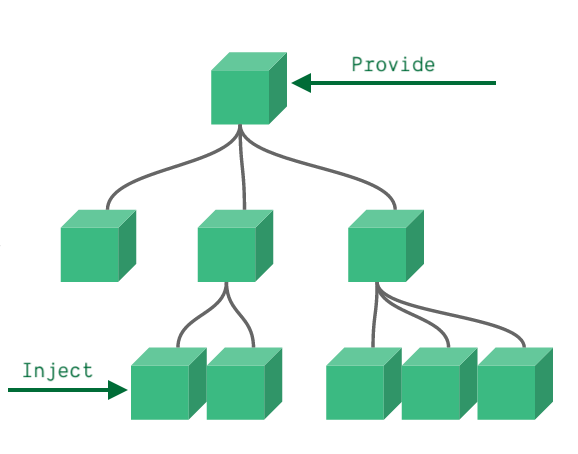# Provide / inject
This page assumes you've already read the Components Basics. Read that first if you are new to components.
Usually, when we need to pass data from the parent to child component, we use props. Imagine the structure where you have some deeply nested components and you only need something from the parent component in the deep nested child. In this case, you still need to pass the prop down the whole component chain which might be annoying.
For such cases, we can use the provide and inject pair. Parent components can serve as dependency provider for all its children, regardless how deep the component hierarchy is. This feature works on two parts: parent component has a provide option to provide data and child component has an inject option to start using this data.

For example, if we have a hierarchy like this:
Root
└─ TodoList
├─ TodoItem
└─ TodoListFooter
├─ ClearTodosButton
└─ TodoListStatistics
2
3
4
5
6
If we want to pass the length of todo-items directly to TodoListStatistics, we would pass the prop down the hierarchy: TodoList -> TodoListFooter -> TodoListStatistics. With provide/inject approach, we can do this directly:
const app = Vue.createApp({})
app.component('todo-list', {
data() {
return {
todos: ['Feed a cat', 'Buy tickets']
}
},
provide: {
user: 'John Doe'
},
template: `
<div>
{{ todos.length }}
<!-- rest of the template -->
</div>
`
})
app.component('todo-list-statistics', {
inject: ['user'],
created() {
console.log(`Injected property: ${this.user}`) // > Injected property: John Doe
}
})
2
3
4
5
6
7
8
9
10
11
12
13
14
15
16
17
18
19
20
21
22
23
24
25
However, this won't work if we try to provide some component instance property here:
app.component('todo-list', {
data() {
return {
todos: ['Feed a cat', 'Buy tickets']
}
},
provide: {
todoLength: this.todos.length // this will result in error `Cannot read property 'length' of undefined`
},
template: `
...
`
})
2
3
4
5
6
7
8
9
10
11
12
13
To access component instance properties, we need to convert provide to be a function returning an object
app.component('todo-list', {
data() {
return {
todos: ['Feed a cat', 'Buy tickets']
}
},
provide() {
return {
todoLength: this.todos.length
}
},
template: `
...
`
})
2
3
4
5
6
7
8
9
10
11
12
13
14
15
This allows us to more safely keep developing that component, without fear that we might change/remove something that a child component is relying on. The interface between these components remains clearly defined, just as with props.
In fact, you can think of dependency injection as sort of “long-range props”, except:
- parent components don’t need to know which descendants use the properties it provides
- child components don’t need to know where injected properties are coming from
# Working with reactivity
In the example above, if we change the list of todos, this change won't be reflected in the injected todoLength property. This is because provide/inject bindings are not reactive by default. We can change this behavior by passing a ref property or reactive object to provide. In our case, if we wanted to react to changes in the ancestor component, we would need to assign a Composition API computed property to our provided todoLength:
app.component('todo-list', {
// ...
provide() {
return {
todoLength: Vue.computed(() => this.todos.length)
}
}
})
app.component('todo-list-statistics', {
inject: ['todoLength'],
created() {
console.log(`Injected property: ${this.todoLength.value}`) // > Injected property: 5
}
})
2
3
4
5
6
7
8
9
10
11
12
13
14
15
In this, any change to todos.length will be reflected correctly in the components, where todoLength is injected. Read more about computed in the Computed and Watch section and reactive provide/inject in the Composition API section.
